Unit 5 Buying and Selling试题(含答案) 冀教版英语八年级下册
文档属性
| 名称 | Unit 5 Buying and Selling试题(含答案) 冀教版英语八年级下册 |
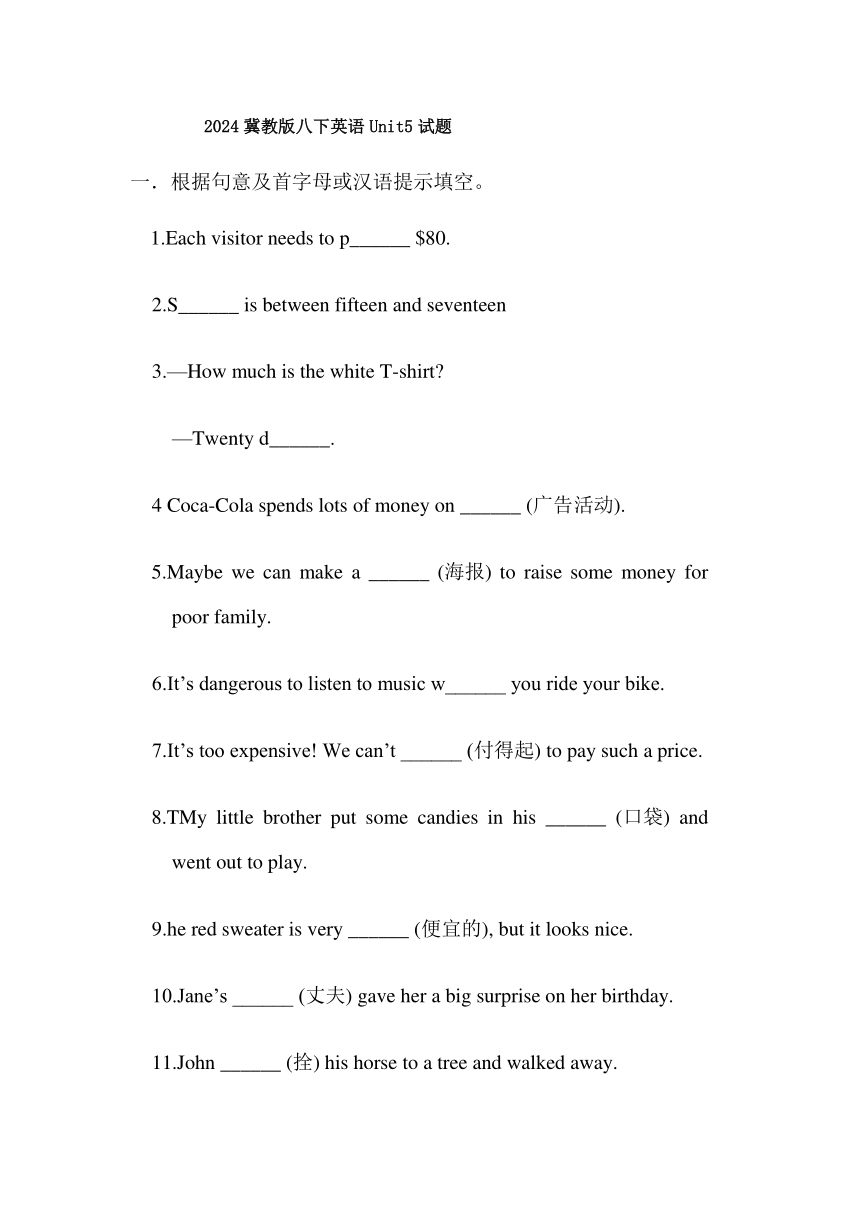
|
|
| 格式 | docx | ||
| 文件大小 | 25.5KB | ||
| 资源类型 | 教案 | ||
| 版本资源 | 冀教版 | ||
| 科目 | 英语 | ||
| 更新时间 | 2024-11-18 11:15:53 | ||
图片预览

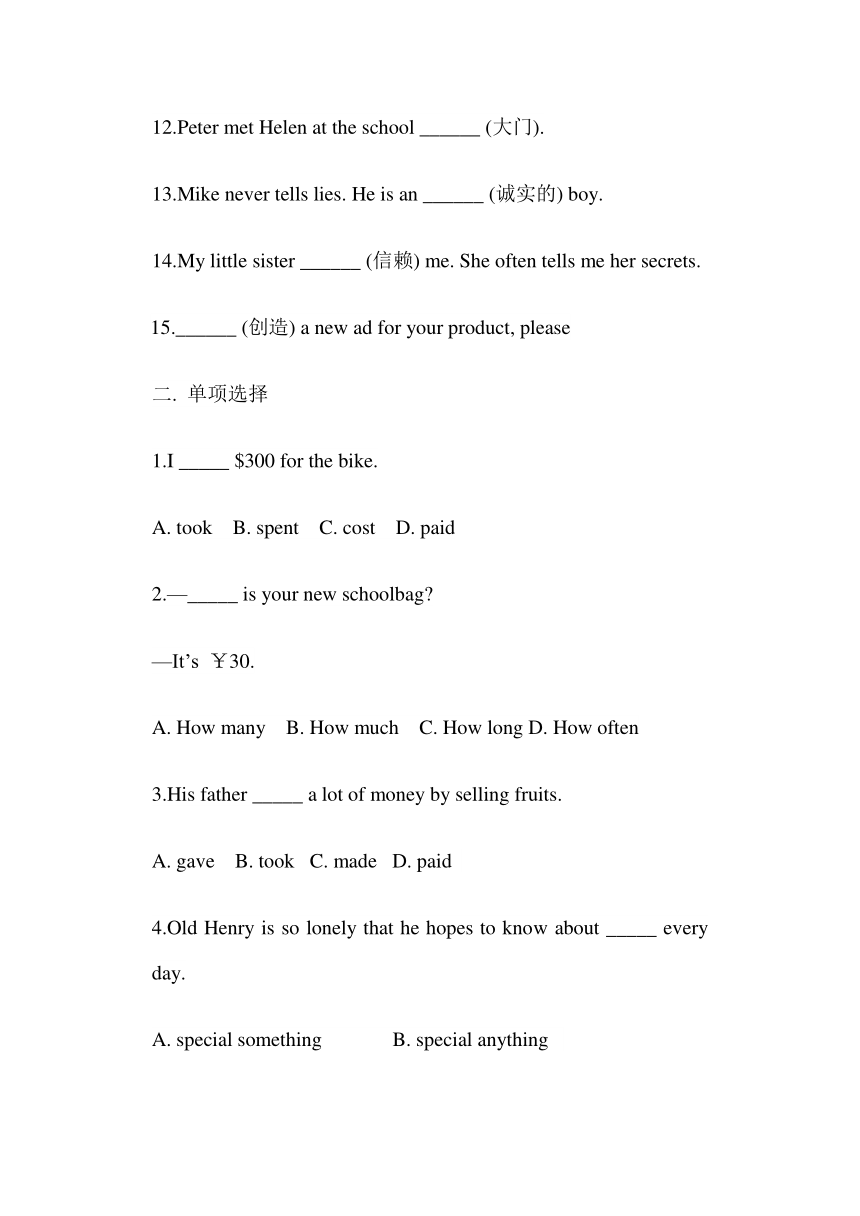
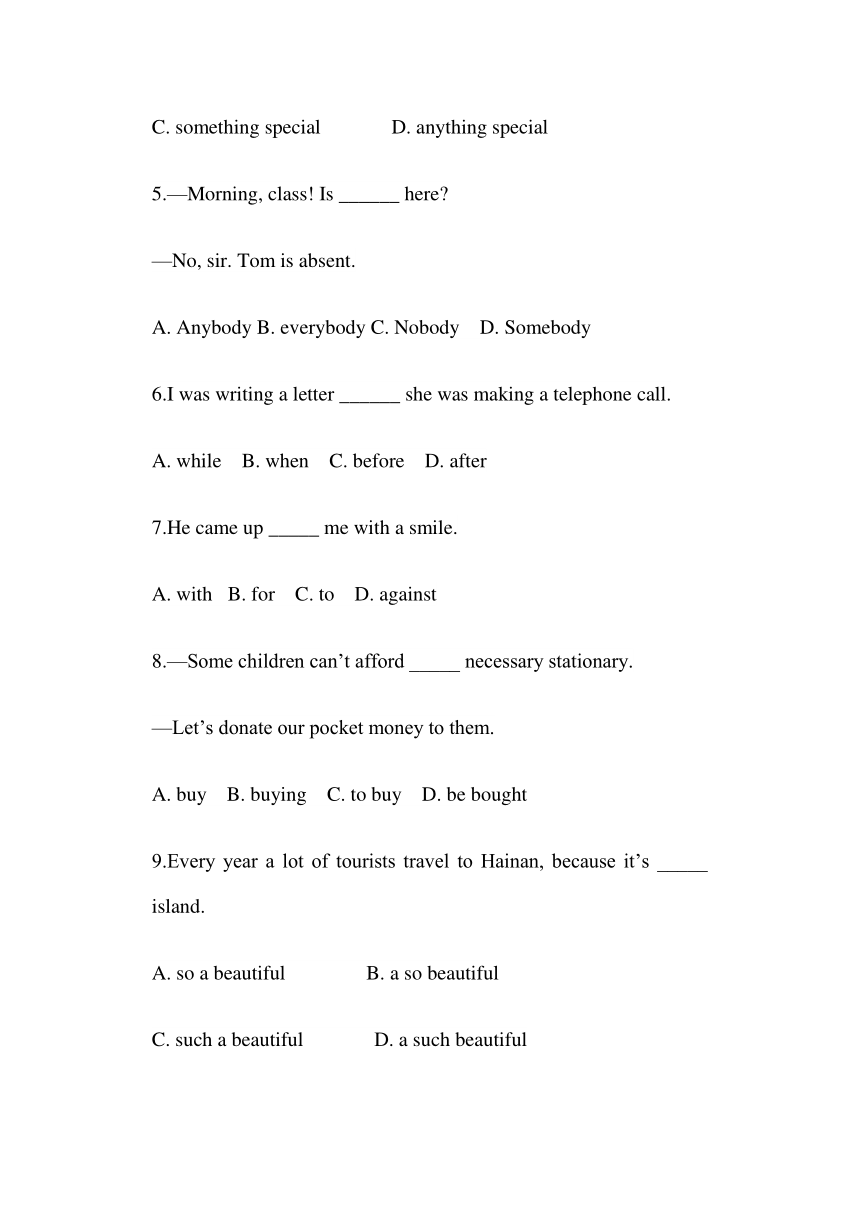
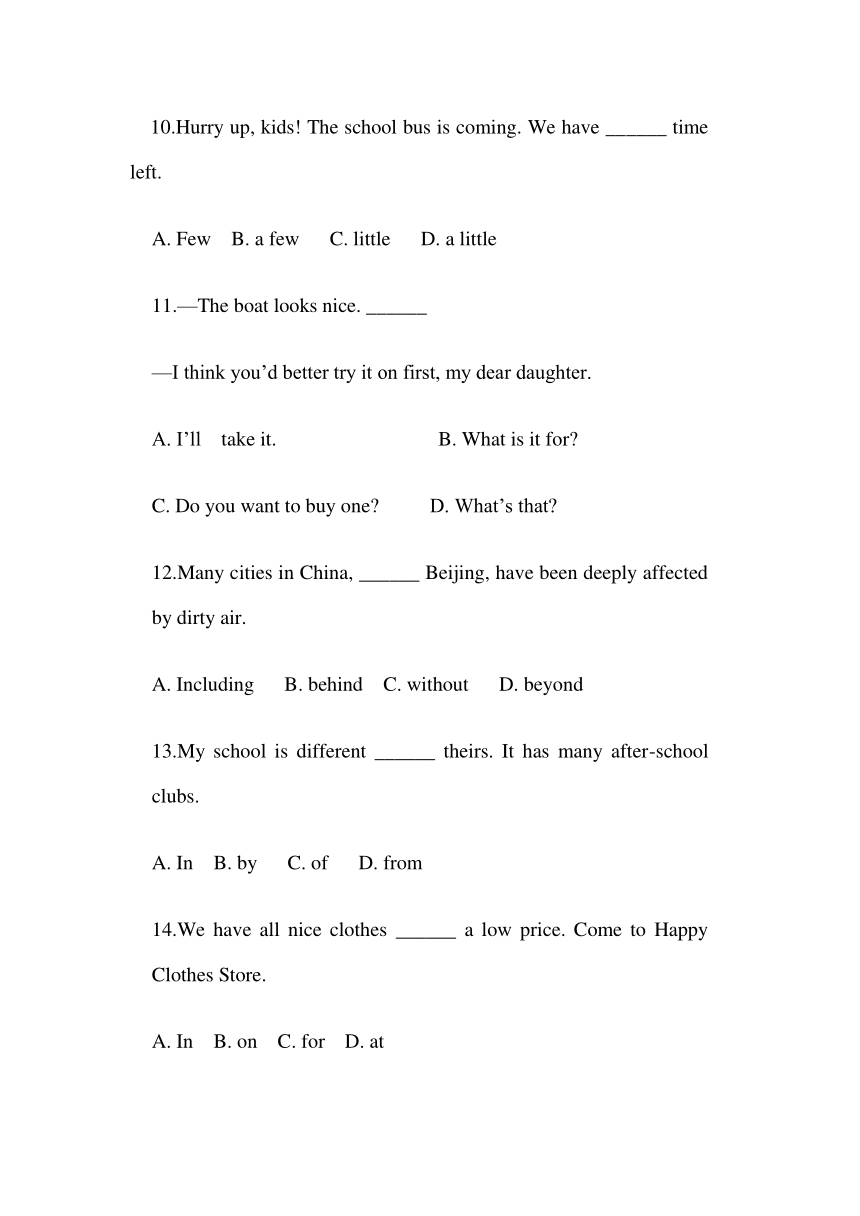
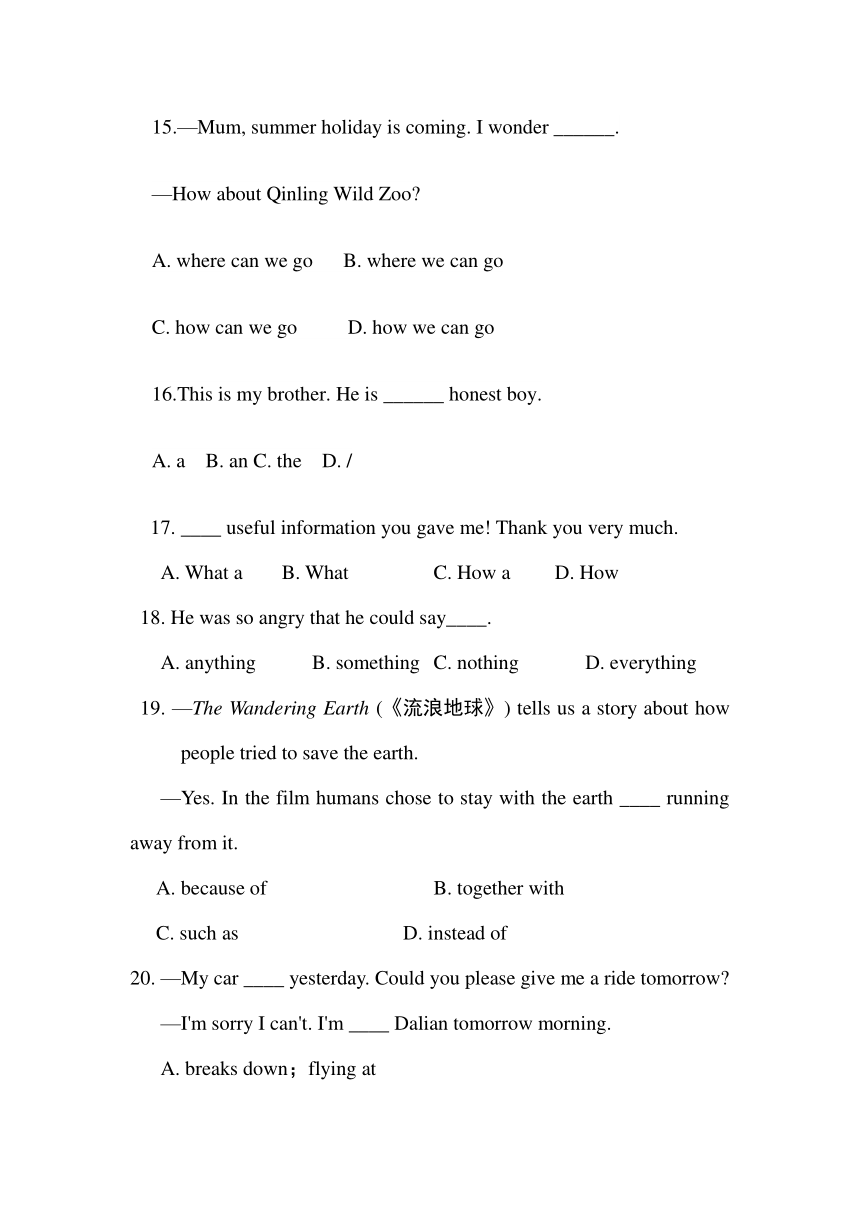
文档简介
2024冀教版八下英语Unit5试题
一.根据句意及首字母或汉语提示填空。
1.Each visitor needs to p______ $80.
2.S______ is between fifteen and seventeen
3.—How much is the white T-shirt
—Twenty d______.
4 Coca-Cola spends lots of money on ______ (广告活动).
5.Maybe we can make a ______ (海报) to raise some money for poor family.
6.It’s dangerous to listen to music w______ you ride your bike.
7.It’s too expensive! We can’t ______ (付得起) to pay such a price.
8.TMy little brother put some candies in his ______ (口袋) and went out to play.
9.he red sweater is very ______ (便宜的), but it looks nice.
10.Jane’s ______ (丈夫) gave her a big surprise on her birthday.
11.John ______ (拴) his horse to a tree and walked away.
12.Peter met Helen at the school ______ (大门).
13.Mike never tells lies. He is an ______ (诚实的) boy.
14.My little sister ______ (信赖) me. She often tells me her secrets.
15.______ (创造) a new ad for your product, please
二. 单项选择
1.I _____ $300 for the bike.
A. took B. spent C. cost D. paid
2.—_____ is your new schoolbag
—It’s ¥30.
A. How many B. How much C. How long D. How often
3.His father _____ a lot of money by selling fruits.
A. gave B. took C. made D. paid
4.Old Henry is so lonely that he hopes to know about _____ every day.
A. special something B. special anything
C. something special D. anything special
5.—Morning, class! Is ______ here
—No, sir. Tom is absent.
A. Anybody B. everybody C. Nobody D. Somebody
6.I was writing a letter ______ she was making a telephone call.
A. while B. when C. before D. after
7.He came up _____ me with a smile.
A. with B. for C. to D. against
8.—Some children can’t afford _____ necessary stationary.
—Let’s donate our pocket money to them.
A. buy B. buying C. to buy D. be bought
9.Every year a lot of tourists travel to Hainan, because it’s _____ island.
A. so a beautiful B. a so beautiful
C. such a beautiful D. a such beautiful
10.Hurry up, kids! The school bus is coming. We have ______ time left.
A. Few B. a few C. little D. a little
11.—The boat looks nice. ______
—I think you’d better try it on first, my dear daughter.
A. I’ll take it. B. What is it for
C. Do you want to buy one D. What’s that
12.Many cities in China, ______ Beijing, have been deeply affected by dirty air.
A. Including B. behind C. without D. beyond
13.My school is different ______ theirs. It has many after-school clubs.
A. In B. by C. of D. from
14.We have all nice clothes ______ a low e to Happy Clothes Store.
A. In B. on C. for D. at
15.—Mum, summer holiday is coming. I wonder ______.
—How about Qinling Wild Zoo
A. where can we go B. where we can go
C. how can we go D. how we can go
16.This is my brother. He is ______ honest boy.
A. a B. an C. the D. /
17. ____ useful information you gave me! Thank you very much.
A. What a B. What C. How a D. How
18. He was so angry that he could say____.
A. anything B. something C. nothing D. everything
19. —The Wandering Earth (《流浪地球》) tells us a story about how people tried to save the earth.
—Yes. In the film humans chose to stay with the earth ____ running away from it.
A. because of B. together with
C. such as D. instead of
20. —My car ____ yesterday. Could you please give me a ride tomorrow
—I'm sorry I can't. I'm ____ Dalian tomorrow morning.
A. breaks down;flying at
B. has broken down; flying at
C. broke down; flying to
D. had broken down; flying to
三.用所给词的正确形式填空
1.Do you know the ______ (mean) of this sentence
2.It’s difficult ______ (understand).
3.He has more friends, ______ (include) Tom and Mike.
4.The man steals money by ______ (make) changes to the company’s accounts.
四.句型转换
1.I don’t know. What is his name (合并为一句)
I don’t know ______ ______ ______ ______.
2.I spent thirty yuan on this ticket. (改为同义句)
I ______ thirty yuan ______ this ticket.
3.I have got some ideas. (改为一般疑问句)
______ you got ______ ideas
4.I will sell some donuts. (对划线部分提问)
______ ______ you sell
5.I need some advertising. (改为否定句)
I ______ ______ ______ advertising.
6.She doesn’t know. What does this word mean (合并为一句)
She doesn’t know what ______ ______ ______.
7.We are in the red this month. (改为同义句)
Our business is ______ ______.
8.I have heard of this story. (改为一般疑问句)
______ you ______ of this story
9.This picture isn’t the same as that one. (改为同义句)
This picture ______ ______ ______ that one.
10.When will you give me back my book, Danny (改为同义句)
When will you ______ my book ______ me, Danny
11.Do you know What color does he like (合并为一句)
Do you know what color ______ ______
12.The news made us feel surprised. (改为同义句)
We ______ ______ at the news.
一、 1. “pay”,“pay + 钱数”表示“支付......钱”,“Each visitor needs to pay $80.”意思是每位游客需要支付 80 美元。 2. “Sixteen”,根据“between fifteen and seventeen”可知是 16,即 sixteen。 3. “dollars”,“Twenty dollars”表示 20 美元。 4. “advertisements”,“advertisement”是可数名词,“lots of”后跟名词复数。 5. “poster”,“make a poster”表示“制作一张海报”。 6. “while”,“while”表示“当......的时候”,“It’s dangerous to listen to music while you ride your bike.”意思是当你骑自行车时听音乐是危险的。 7. “afford”,“can't afford to do sth.”表示“负担不起做某事”。 8. “pocket”,“in his pocket”表示“在他的口袋里”。 9. “cheap”,“cheap”表示“便宜的”。 10. “husband”,“Jane’s husband”表示“简的丈夫”。 11. “tied”,“tie...to...”表示“把......系到......上”,此处用过去式“tied”。 12. “gate”,“at the school gate”表示“在学校门口”。 13. “honest”,“an honest boy”表示“一个诚实的男孩”。 14. “trusts”,“trust”表示“信赖”,主语是“My little sister”,谓语用第三人称单数形式。 15. “Create”,这是一个祈使句,用动词原形。 二、 1. D :“pay...for...”是固定搭配,表示“为......付款”。A 选项“took”常用于“It takes sb. some time to do sth.”句型;B 选项“spent”的用法是“spend...on sth.”或“spend...(in) doing sth.”;C 选项“cost”的主语通常是物。 2. B :“How much”用于询问价格;“How many”询问数量;“How long”询问时间长短;“How often”询问频率。 3. C :“make money”表示“赚钱”。A 选项“gave”意为“给”;B 选项“took”意为“拿,取”;D 选项“paid”意为“支付”。 4. C :“something”用于肯定句,“anything”用于否定句和疑问句,且形容词修饰不定代词时要后置。 5. B :“everybody”表示“每个人,大家”;“Anybody”常用于否定句和疑问句;“Nobody”表示“没有人”;“Somebody”表示“某人”。 6. A :“while”表示两个动作同时进行;“when”表示一个动作在另一个动作发生时进行;“before”表示“在......之前”;“after”表示“在......之后”。 7. C :“come up to sb.”表示“走到某人跟前”。 8. C :“afford to do sth.”表示“负担得起做某事”。 9. C :“such a/an + 形容词 + 名词”;“so + 形容词 + a/an + 名词”。“island”是可数名词单数,且以元音音素开头,用“such a beautiful”。 10. C :“few”和“a few”修饰可数名词,“little”和“a little”修饰不可数名词,“few”和“little”表示否定,“a few”和“a little”表示肯定。“time”是不可数名词,此处表示“几乎没时间”,用“little”。 11. A :“I'll take it.”表示“我要买它”;“What is it for ”表示“它是用来做什么的?”;“Do you want to buy one ”表示“你想买一个吗?”;“What's that ”表示“那是什么?”。根据语境选 A。 12. A :“including”表示“包括”;“behind”表示“在......后面”;“without”表示“没有”;“beyond”表示“超过”。 13. D :“be different from”表示“与......不同”。 14. D :“at a low price”表示“以低价”。 15. B :宾语从句要用陈述句语序,排除 A、C。根据回答“How about Qinling Wild Zoo ”可知是问地点,用“where”。 16. B :“honest”以元音音素开头,用“an”。 17. B :“information”是不可数名词,“What + 形容词 + 不可数名词 + 主语 + 谓语!”,“How + 形容词/副词 + 主语 + 谓语!”,此处用“What”。 18. C :“so...that...”表示“如此......以至于......”,他太生气以至于什么也说不出来,用“nothing”。 19. D :“instead of”表示“而不是”;“because of”表示“因为”;“together with”表示“和......一起”;“such as”表示“例如”。 20. C :“yesterday”是一般过去时的标志,“break down”的过去式是“broke down”;“fly to + 地点”,表示“飞往某地”,“tomorrow morning”是一般将来时,用“be doing”形式。 三、 1. “meaning”,“the meaning of...”表示“......的意思”。 2. “to understand”,“It’s + 形容词 + to do sth.”表示“做某事是......的”。 3. “including”,是介词,意为“包括”。 4. “making”,“by”是介词,后接动名词。 四、 1. 合并宾语从句要用陈述句语序,即“what his name is”。 2. “spend money on sth.”相当于“pay money for sth.”。 3. 一般疑问句将“Have”提前,“some”在一般疑问句中变为“any”。 4. 对物品提问用“What”,“will”提到主语前。 5. 否定句在“need”前加“don't”,“some”变为“any”。 6. 宾语从句要用陈述句语序,即“this word means”。 7. “be in the red”相当于“lose money”,表示“亏损”。 8. 一般疑问句将“Have”提前。 9. “be not the same as”相当于“be different from”,表示“与......不同”。 10. “give back”相当于“return...to...”,表示“归还”。 11. 宾语从句要用陈述句语序,即“he likes”。 12. “be surprised at...”表示“对......感到惊讶”,原句“made us feel surprised”相当于“were surprised at”。
一.根据句意及首字母或汉语提示填空。
1.Each visitor needs to p______ $80.
2.S______ is between fifteen and seventeen
3.—How much is the white T-shirt
—Twenty d______.
4 Coca-Cola spends lots of money on ______ (广告活动).
5.Maybe we can make a ______ (海报) to raise some money for poor family.
6.It’s dangerous to listen to music w______ you ride your bike.
7.It’s too expensive! We can’t ______ (付得起) to pay such a price.
8.TMy little brother put some candies in his ______ (口袋) and went out to play.
9.he red sweater is very ______ (便宜的), but it looks nice.
10.Jane’s ______ (丈夫) gave her a big surprise on her birthday.
11.John ______ (拴) his horse to a tree and walked away.
12.Peter met Helen at the school ______ (大门).
13.Mike never tells lies. He is an ______ (诚实的) boy.
14.My little sister ______ (信赖) me. She often tells me her secrets.
15.______ (创造) a new ad for your product, please
二. 单项选择
1.I _____ $300 for the bike.
A. took B. spent C. cost D. paid
2.—_____ is your new schoolbag
—It’s ¥30.
A. How many B. How much C. How long D. How often
3.His father _____ a lot of money by selling fruits.
A. gave B. took C. made D. paid
4.Old Henry is so lonely that he hopes to know about _____ every day.
A. special something B. special anything
C. something special D. anything special
5.—Morning, class! Is ______ here
—No, sir. Tom is absent.
A. Anybody B. everybody C. Nobody D. Somebody
6.I was writing a letter ______ she was making a telephone call.
A. while B. when C. before D. after
7.He came up _____ me with a smile.
A. with B. for C. to D. against
8.—Some children can’t afford _____ necessary stationary.
—Let’s donate our pocket money to them.
A. buy B. buying C. to buy D. be bought
9.Every year a lot of tourists travel to Hainan, because it’s _____ island.
A. so a beautiful B. a so beautiful
C. such a beautiful D. a such beautiful
10.Hurry up, kids! The school bus is coming. We have ______ time left.
A. Few B. a few C. little D. a little
11.—The boat looks nice. ______
—I think you’d better try it on first, my dear daughter.
A. I’ll take it. B. What is it for
C. Do you want to buy one D. What’s that
12.Many cities in China, ______ Beijing, have been deeply affected by dirty air.
A. Including B. behind C. without D. beyond
13.My school is different ______ theirs. It has many after-school clubs.
A. In B. by C. of D. from
14.We have all nice clothes ______ a low e to Happy Clothes Store.
A. In B. on C. for D. at
15.—Mum, summer holiday is coming. I wonder ______.
—How about Qinling Wild Zoo
A. where can we go B. where we can go
C. how can we go D. how we can go
16.This is my brother. He is ______ honest boy.
A. a B. an C. the D. /
17. ____ useful information you gave me! Thank you very much.
A. What a B. What C. How a D. How
18. He was so angry that he could say____.
A. anything B. something C. nothing D. everything
19. —The Wandering Earth (《流浪地球》) tells us a story about how people tried to save the earth.
—Yes. In the film humans chose to stay with the earth ____ running away from it.
A. because of B. together with
C. such as D. instead of
20. —My car ____ yesterday. Could you please give me a ride tomorrow
—I'm sorry I can't. I'm ____ Dalian tomorrow morning.
A. breaks down;flying at
B. has broken down; flying at
C. broke down; flying to
D. had broken down; flying to
三.用所给词的正确形式填空
1.Do you know the ______ (mean) of this sentence
2.It’s difficult ______ (understand).
3.He has more friends, ______ (include) Tom and Mike.
4.The man steals money by ______ (make) changes to the company’s accounts.
四.句型转换
1.I don’t know. What is his name (合并为一句)
I don’t know ______ ______ ______ ______.
2.I spent thirty yuan on this ticket. (改为同义句)
I ______ thirty yuan ______ this ticket.
3.I have got some ideas. (改为一般疑问句)
______ you got ______ ideas
4.I will sell some donuts. (对划线部分提问)
______ ______ you sell
5.I need some advertising. (改为否定句)
I ______ ______ ______ advertising.
6.She doesn’t know. What does this word mean (合并为一句)
She doesn’t know what ______ ______ ______.
7.We are in the red this month. (改为同义句)
Our business is ______ ______.
8.I have heard of this story. (改为一般疑问句)
______ you ______ of this story
9.This picture isn’t the same as that one. (改为同义句)
This picture ______ ______ ______ that one.
10.When will you give me back my book, Danny (改为同义句)
When will you ______ my book ______ me, Danny
11.Do you know What color does he like (合并为一句)
Do you know what color ______ ______
12.The news made us feel surprised. (改为同义句)
We ______ ______ at the news.
一、 1. “pay”,“pay + 钱数”表示“支付......钱”,“Each visitor needs to pay $80.”意思是每位游客需要支付 80 美元。 2. “Sixteen”,根据“between fifteen and seventeen”可知是 16,即 sixteen。 3. “dollars”,“Twenty dollars”表示 20 美元。 4. “advertisements”,“advertisement”是可数名词,“lots of”后跟名词复数。 5. “poster”,“make a poster”表示“制作一张海报”。 6. “while”,“while”表示“当......的时候”,“It’s dangerous to listen to music while you ride your bike.”意思是当你骑自行车时听音乐是危险的。 7. “afford”,“can't afford to do sth.”表示“负担不起做某事”。 8. “pocket”,“in his pocket”表示“在他的口袋里”。 9. “cheap”,“cheap”表示“便宜的”。 10. “husband”,“Jane’s husband”表示“简的丈夫”。 11. “tied”,“tie...to...”表示“把......系到......上”,此处用过去式“tied”。 12. “gate”,“at the school gate”表示“在学校门口”。 13. “honest”,“an honest boy”表示“一个诚实的男孩”。 14. “trusts”,“trust”表示“信赖”,主语是“My little sister”,谓语用第三人称单数形式。 15. “Create”,这是一个祈使句,用动词原形。 二、 1. D :“pay...for...”是固定搭配,表示“为......付款”。A 选项“took”常用于“It takes sb. some time to do sth.”句型;B 选项“spent”的用法是“spend...on sth.”或“spend...(in) doing sth.”;C 选项“cost”的主语通常是物。 2. B :“How much”用于询问价格;“How many”询问数量;“How long”询问时间长短;“How often”询问频率。 3. C :“make money”表示“赚钱”。A 选项“gave”意为“给”;B 选项“took”意为“拿,取”;D 选项“paid”意为“支付”。 4. C :“something”用于肯定句,“anything”用于否定句和疑问句,且形容词修饰不定代词时要后置。 5. B :“everybody”表示“每个人,大家”;“Anybody”常用于否定句和疑问句;“Nobody”表示“没有人”;“Somebody”表示“某人”。 6. A :“while”表示两个动作同时进行;“when”表示一个动作在另一个动作发生时进行;“before”表示“在......之前”;“after”表示“在......之后”。 7. C :“come up to sb.”表示“走到某人跟前”。 8. C :“afford to do sth.”表示“负担得起做某事”。 9. C :“such a/an + 形容词 + 名词”;“so + 形容词 + a/an + 名词”。“island”是可数名词单数,且以元音音素开头,用“such a beautiful”。 10. C :“few”和“a few”修饰可数名词,“little”和“a little”修饰不可数名词,“few”和“little”表示否定,“a few”和“a little”表示肯定。“time”是不可数名词,此处表示“几乎没时间”,用“little”。 11. A :“I'll take it.”表示“我要买它”;“What is it for ”表示“它是用来做什么的?”;“Do you want to buy one ”表示“你想买一个吗?”;“What's that ”表示“那是什么?”。根据语境选 A。 12. A :“including”表示“包括”;“behind”表示“在......后面”;“without”表示“没有”;“beyond”表示“超过”。 13. D :“be different from”表示“与......不同”。 14. D :“at a low price”表示“以低价”。 15. B :宾语从句要用陈述句语序,排除 A、C。根据回答“How about Qinling Wild Zoo ”可知是问地点,用“where”。 16. B :“honest”以元音音素开头,用“an”。 17. B :“information”是不可数名词,“What + 形容词 + 不可数名词 + 主语 + 谓语!”,“How + 形容词/副词 + 主语 + 谓语!”,此处用“What”。 18. C :“so...that...”表示“如此......以至于......”,他太生气以至于什么也说不出来,用“nothing”。 19. D :“instead of”表示“而不是”;“because of”表示“因为”;“together with”表示“和......一起”;“such as”表示“例如”。 20. C :“yesterday”是一般过去时的标志,“break down”的过去式是“broke down”;“fly to + 地点”,表示“飞往某地”,“tomorrow morning”是一般将来时,用“be doing”形式。 三、 1. “meaning”,“the meaning of...”表示“......的意思”。 2. “to understand”,“It’s + 形容词 + to do sth.”表示“做某事是......的”。 3. “including”,是介词,意为“包括”。 4. “making”,“by”是介词,后接动名词。 四、 1. 合并宾语从句要用陈述句语序,即“what his name is”。 2. “spend money on sth.”相当于“pay money for sth.”。 3. 一般疑问句将“Have”提前,“some”在一般疑问句中变为“any”。 4. 对物品提问用“What”,“will”提到主语前。 5. 否定句在“need”前加“don't”,“some”变为“any”。 6. 宾语从句要用陈述句语序,即“this word means”。 7. “be in the red”相当于“lose money”,表示“亏损”。 8. 一般疑问句将“Have”提前。 9. “be not the same as”相当于“be different from”,表示“与......不同”。 10. “give back”相当于“return...to...”,表示“归还”。 11. 宾语从句要用陈述句语序,即“he likes”。 12. “be surprised at...”表示“对......感到惊讶”,原句“made us feel surprised”相当于“were surprised at”。
同课章节目录
- Unit 1 Spring Is Coming
- Lesson 1 How's the weather?
- Lesson 2 It's Getting Warmer!
- Lesson 3 Sun Is Rising
- Lesson 4 The Spring City
- Lesson 5 Babysitting on a Spring Day
- Lesson 6 Stories about Spring
- Unit 2 Plant a Plant
- Lesson 7 Planting Trees
- Lesson 8 Why Are Plants Important?
- Lesson 9 Gardening with Mary
- Lesson 10 Make Your Garden Grow!
- Lesson 11 Amazing Plants
- Lesson 12 Danny's Plant
- Unit 3 Animals Are Our Friends
- Lesson 13 Danny's Big Scare
- Lesson 14 Amazing Animals
- Lesson 15 The Zoo Is Open
- Lesson 16 The Pear Escaped
- Lesson 17 Save the Tigers
- Lesson 18 Friendship Between Animals
- Unit 4 The Internet Connects Us
- Lesson 19 How Do You Use the Internet?
- Lesson 20 A Computer Helps!
- Lesson 21 Books or Computers?
- Lesson 22 Travel on the Internet
- Lesson 23 The Internet--Good or Bad?
- Lesson 24 An E-mail to Grandpa
- Unit 5 Buying and Selling
- Lesson 25 Raising Money
- Lesson 26 Cookies, Please!
- Lesson 27 Business English
- Lesson 28 Ms. Liu's Great Idea
- Lesson 29 How to Push a Product
- Lesson 30 A Cookie Sale
- Unit 6 Be a Champion!
- Lesson 31 Don't Fall, Danny
- Lesson 32 My Favourite Record
- Lesson 33 2800 Years of Sports
- Lesson 34 Modern Olympics
- Lesson 35 The Dream Team
- Lesson 36 Classroom Olympics
- Unit 7 Know Our World
- Lesson 37 Let's Learn Geography!
- Lesson 38 The World Is a Big Place
- Lesson 39 Ring Up or Call?
- Lesson 40 Body Language
- Lesson 41 A Class of the World
- Lesson 42 North America
- Unit 8 Save Our World
- Lesson 43 Let's Clean Up!
- Lesson 44 Environment Clubs
- Lesson 45 Let's Sort Garbage!
- Lesson 46 Protect Our Environment
- Lesson 47 Connected to Nature
- Lesson 48 Garbage Is Interesting!
